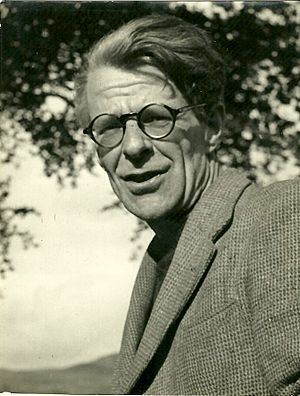Eric Cross (writer) facts for kids
Quick facts for kids
Eric Cross
|
|
|---|---|
 |
|
| Born | 1903/1905 Newry, County Down, Ireland
|
| Died | 5 September 1980 County Mayo
|
Eric Cross (born around 1903 or 1905, died 1980) was a talented Irish writer and radio personality. He is best known for his book The Tailor and Ansty, which shared the funny and wise stories of an old couple from rural Ireland.
Contents
Early Life and Education
Eric Cross was born in Newry, County Down, Ireland, either in 1903 or 1905. He didn't remember much about his early childhood there. His mother was a nurse who had worked in South Africa. From age 10, Eric went to many different schools in northern England. He started studying medicine at Manchester University. After six months, he changed his studies to chemistry in London.
A Career of Many Talents
After finishing his studies, Eric Cross wrote a textbook about chemistry. He then worked in the biochemical industry for 15 years. The writer Benedict Kiely once suggested that Cross left this work to become a writer. This was because he was working on projects related to chemical development.
In 1936, Cross moved to Ireland, first living in Dublin. He reportedly bought a caravan and a horse. He spent six weeks traveling to Gougane Barra, a beautiful area in County Cork. There, he lived in his caravan and ate at a local hotel.
The Tailor and Ansty
Eric Cross met an old country tailor and storyteller named Timothy Buckley and his wife Anastasia in the 1920s. He later moved to Gougane Barra to be closer to them. He recorded their stories and sayings. In 1942, he published these as The Tailor and Ansty in The Bell magazine. Later, it became a full book with an introduction by Frank O'Connor.
The book was very popular with critics. However, some people, including the Catholic dean of Cork, did not like it. The book was banned by the Censorship Board in Ireland on September 28, 1942. This happened during the government of Éamon de Valera. The ban was possibly because the book openly discussed natural topics. Some neighbors were very angry. Three priests made Timothy Buckley burn the book in his own fireplace.
In the 1960s, censorship laws became less strict. Eric Cross's book was the first to have its ban removed. In 1968, P. J. O'Connor turned the book into a play. It was performed at the Peacock Theatre and has been staged many times since.
Other Inventions and Writings
Eric Cross was also an inventor. He found a way to make turf as strong as coal. He also created "magnastone," a new material that looked like marble. During World War II, he came up with clever ways to make things. He made knitting needles from bicycle wheel spokes. He also made platform shoes using rejected parts from Beamish porter barrels.
In 1953, he moved to Cloona Lodge, near Westport, County Mayo. There, he taught the children of Joseph and Sonia Kelly. In 1968, he published Map of Time, a world history book. It focused on Ireland from 400 AD onwards.
Cross also contributed spoken essays to the RTÉ Radio series Sunday Miscellany. He wrote short stories for the BBC. A collection of his stories and essays, called Silence is Golden, came out in 1978.
Later Life and Legacy
Eric Cross lived a quiet life in County Mayo. He passed away on September 5, 1980. The writer Sean O'Faolain compared Cross's book to other famous Irish rural stories. These included The Islandman and Twenty Years A-Growing. While some praised his work, it has not received much attention from critics since its publication.
See also
- Jude the Obscure

